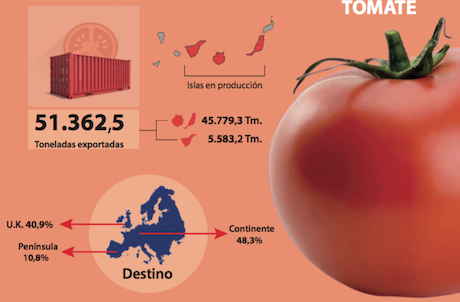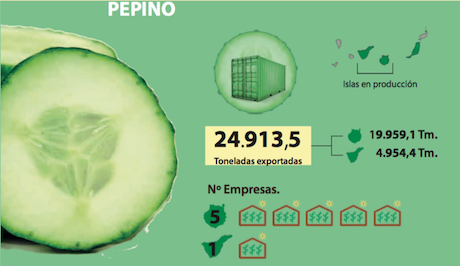The Federation of Horticultural Producers of the province of Las Palmas, FEDEX, and the Association of Exporting Harvesters of Tenerife, ACETO, have put an end to the 2018/2019 campaign with a substantial improvement compared to the previous one.
In the case of the province of Las Palmas, the results are better than in the previous campaign. So much so that, despite the shorter exporting period, the reduction of the acreage by 51 hectares and the loss of a company, the volume of tomatoes exported has still been two thousand tons greater (45,779.3 t) than in the 2017/18 season (43,717.1 t), which is almost 5% more.

For its part, the province of Santa Cruz de Tenerife has seen a drastic reduction in the volume exported, going from 7,920.2 tons in the 2017/18 season to 5,583.2 tons in the most recent harvest; 29.5% less. This drop is mainly a consequence of the number of producing companies exporting, which has fallen from five in the previous campaign to just two this time.
As for the Canary Islands' global exports during the 2018/19 season, tomatoes, cucumbers, blueberries, zucchini, peppers and aubergines are the most important products, with a total of 76,618.2 tons exported; that is, 1,884.5 tons more than in the previous campaign.
It is worth pointing out that practically the entire month of May, which is usually an interesting month, has been lost this campaign due to the fruit volume available. On this occasion, the drastic reduction of prices has been decisive in stopping shipments and putting an end to the campaign.
In general, despite the decline recorded in the province of Santa Cruz de Tenerife, the results have improved and suggest that this could be the trend for the next campaigns.
The increase in the aid per hectare (conditioned to the improvement plan) is yielding the first results. The growth of the production using a smaller acreage is a clear indicative of this.
However, not everything ahead for Canary exporters will be positive. The uncertainty of Brexit, which has been delayed to October, is still looming. The sector is very concerned by the fact that October is usually when the campaign's shipments start.
The spread of the Tuta absoluta pest is also a cause of unrest, as exporting producers suffered damages at the end of the campaign, while those selling in the local market already accumulate huge losses.
This campaign, like the previous ones, has also been marked by the impact of climate change. The lack of rainfall and the high temperatures resulted in another atypical winter for the Archipelago.

While tomato growers have had an acceptable campaign, the same hasn't applied to those producing cucumbers. The disastrous prices paid when the harvest period was at its peak, caused mostly by overproduction in other exporting areas, made it necessary to destroy thousands of tons. Furthermore, the issues with transport and logistics made it more difficult to reach customers in the best conditions.
Given these results, it is likely that things will remain more or less stable in the next tomato campaign, while the cucumber acreage may be considerably reduced.
For more information:
Fedex
Gustavo Rodríguez
+34 600 505 561
